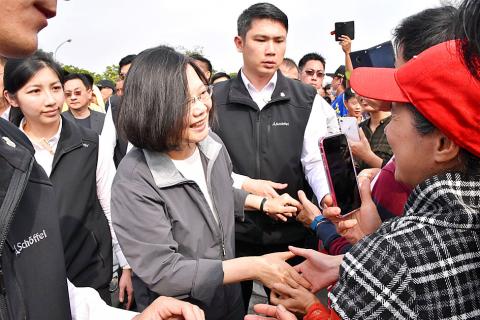President Tsai-Ing-wen (蔡英文) yesterday confirmed that she would run for re-election next year to complete her vision for the nation.
“It’s natural that any sitting president wants to do more for the country and wants to finish things on his or her agenda,” Tsai said in an interview with CNN’s Matt Rivers aboard the presidential plane, when asked about her plans for next year’s presidential election.
Asked if that means she would seek re-election, Tsai nodded and said: “Yes, yes.”

Photo: Huang Shu-li, Taipei Times
The interview took place on Monday, the Presidential Office said.
Tsai said she was confident about her prospects, adding that it is “something I have prepared for.”
However, she is also aware of the challenges ahead.
“It’s again another challenge. Being president, you’re not short of challenges. At good times you have challenges of one sort, and in bad times you have challenges of another sort,” said Tsai, whose approval rating remains below 40 percent.
In November last year, Tsai’s Democratic Progressive Party (DPP) suffered heavy losses in elections for local government leaders, which many saw as a referendum on her leadership and her administration’s performance.
Tsai stepped down as party chairperson to take responsibility for the losses. Senior pro-Taiwan independence advocates have urged her not to run for re-election amid concerns that this could pave the way for the China-leaning Chinese Nationalist Party (KMT) to retake power.
The Presidential Office yesterday said that Tsai’s primary purpose for accepting the interview with CNN was to give Taiwan a voice through an international media outlet.
During the interview, she discussed the current international situation, spoke about why she believes Taiwan will play an increasingly crucial role in global affairs and elaborated on cross-strait relations, the office said.
Presidential Office spokesman Xavier Chang (張惇涵) said Tsai became an “endorser” for Taiwan during the interview, taking CNN’s correspondent to Taipei’s Ximending (西門町) area to taste traditional Taiwanese dishes, such as pork chops with rice and chicken thighs.
Through the interview, Tsai hoped to show the world the different aspects — both traditional and modern — of Taiwan, he added.

‘TAIWAN-FRIENDLY’: The last time the Web site fact sheet removed the lines on the US not supporting Taiwanese independence was during the Biden administration in 2022 The US Department of State has removed a statement on its Web site that it does not support Taiwanese independence, among changes that the Taiwanese government praised yesterday as supporting Taiwan. The Taiwan-US relations fact sheet, produced by the department’s Bureau of East Asian and Pacific Affairs, previously stated that the US opposes “any unilateral changes to the status quo from either side; we do not support Taiwan independence; and we expect cross-strait differences to be resolved by peaceful means.” In the updated version published on Thursday, the line stating that the US does not support Taiwanese independence had been removed. The updated

‘CORRECT IDENTIFICATION’: Beginning in May, Taiwanese married to Japanese can register their home country as Taiwan in their spouse’s family record, ‘Nikkei Asia’ said The government yesterday thanked Japan for revising rules that would allow Taiwanese nationals married to Japanese citizens to list their home country as “Taiwan” in the official family record database. At present, Taiwanese have to select “China.” Minister of Foreign Affairs Lin Chia-lung (林佳龍) said the new rule, set to be implemented in May, would now “correctly” identify Taiwanese in Japan and help protect their rights, the Ministry of Foreign Affairs said in a statement. The statement was released after Nikkei Asia reported the new policy earlier yesterday. The name and nationality of a non-Japanese person marrying a Japanese national is added to the

AT RISK: The council reiterated that people should seriously consider the necessity of visiting China, after Beijing passed 22 guidelines to punish ‘die-hard’ separatists The Mainland Affairs Council (MAC) has since Jan. 1 last year received 65 petitions regarding Taiwanese who were interrogated or detained in China, MAC Minister Chiu Chui-cheng (邱垂正) said yesterday. Fifty-two either went missing or had their personal freedoms restricted, with some put in criminal detention, while 13 were interrogated and temporarily detained, he said in a radio interview. On June 21 last year, China announced 22 guidelines to punish “die-hard Taiwanese independence separatists,” allowing Chinese courts to try people in absentia. The guidelines are uncivilized and inhumane, allowing Beijing to seize assets and issue the death penalty, with no regard for potential

‘UNITED FRONT’ FRONTS: Barring contact with Huaqiao and Jinan universities is needed to stop China targeting Taiwanese students, the education minister said Taiwan has blacklisted two Chinese universities from conducting academic exchange programs in the nation after reports that the institutes are arms of Beijing’s United Front Work Department, Minister of Education Cheng Ying-yao (鄭英耀) said in an exclusive interview with the Chinese-language Liberty Times (the Taipei Times’ sister paper) published yesterday. China’s Huaqiao University in Xiamen and Quanzhou, as well as Jinan University in Guangzhou, which have 600 and 1,500 Taiwanese on their rolls respectively, are under direct control of the Chinese government’s political warfare branch, Cheng said, citing reports by national security officials. A comprehensive ban on Taiwanese institutions collaborating or